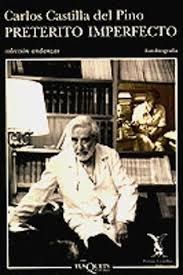
Original Language: castellano
Year of publication: 1997
Valoración: Recommended
To be honest I recognize that, in a lazy reader, perhaps a third of the book looked with sweet eyes those finite tenderloin volumes waiting on the shelf. Very bad, I know, but this semi-touch of five hundred long pages of a rather brief typography made me a little uphill in some moments, and that the memoirs of the psychiatrist Carlos Castilla del Pino Olive HouseOf Longitud similar).
And it is that the author is surely excessive in the details, he values and dissects everything, every situation, each character (and are tens, perhaps hundreds), he recounts with the precision of something that would have happened yesterday, not in vain it seems that he keeps an enormous number of documents, collegial and university notes, press clippings, letters, appointments, roles in which he supports his memory or with which he investigates in each circumstance in each circumstance in each circumstance. To defend his argument before a court. It would be said that, rather than telling his life, what he tries is to rebuild the point by point so that, once printed, he is fixed forever.
But, of course, the point is that what counts is almost always interesting, from childhood in a conservative and well -off family (complicated relationships with their parents and sisters, the group of friends of the people, the hateful internship in the Salesians) until the beginning of the civil war when, wrapped in its closest environment, it is ready in the request being a teenager and attends the murder of several relatives by the militiamen. At that stage the anticlericalism and antimilitarism of those Castilla shows throughout the book, trends that would be accentuated and consolidated until ending in its communist militancy many years later, which remains already out of the book.
Located then, by origin and education, in the field of Catholic traditionalism, the young Castile sees the deep contempt for the brutality and inculture is born, and we discover that struggle between two of the pillars of Francoism, traditionalists in principle monarchists vs. Falangists, perhaps more moral or intellectual confrontation than political, who always wanted to hide and that would greatly last throughout the life of the regime.
Castilla, so young, shows an unstoppable voracity of knowing, is an insatiable reader, and is very clear about his medical vocation, to the point that times allow it, he frequently assists autopsies of age still adolescent. But the most interesting thing about this stage is that, from an undoubtedly high cultural position, its rejection is set towards a system that, only based on suspicion or disaffection, replaces researchers and professors of great value with friends, balls or spokesmen of the winning side. The author cannot withstand that triumph of mediocrity and servility, and in a few years an initially warm posture and mediated by the family origin first goes to a stage of rebellion something unconscious, until it leads to an increasingly firm opposition to the dominant shabby in the official spheres.
Castilla is not (yet) a red in the ideological sense but, as he refers, this required an evolution ‘From the mere anti -Franco (anticlerical and antimilitarist) intellectualism to a real left awareness’process in which the Azañista Vicente Lizarraga had a lot to do. Interesting concept of ‘Anti -Francoist intellectualism’ Because at that time, 40-50 years, with the Republicans defeated and reprisals, killed or in exile their leaders, that of intellectuals was perhaps one of the redoubts where an opposition began to germinate that would still have to wait to acquire some solidity.
There are naturally much more, from confessions about adolescent and youth loves to detailed stories about the university stage, the practice of medicine in a asylum or seasons in the university militia, where all the contempt for military life, its routines, its liturgy and its intellectual poor. Of course it also has the appeal to see a large number of significant names of the time parade, such as Laín Entralgo, the controversial López Ibor (who was superior in Castile in a long stage), Jaime de Mora, Ortega, Gregorio Marañón, Luis Martín Santos, Martínez Bordiú, Baroja, Torrente Ballester. A cast of characters that, together with many others that will be unknown to us, make up a very direct photograph of that dark and overwhelming stage, of such a mediocrity that is very well understood how difficult it must have been, of course for any citizen, but very particular for those with a minimal concern for culture and reason.
Source: https://unlibroaldia.blogspot.com/2025/03/carlos-castilla-del-pino-preterito.html


